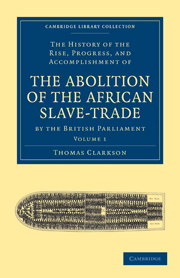Book contents
Summary
On my return to London, I called upon William Dillwyn, to inform him of the resolution I had made at Teston, and found him at his town lodgings in the Poultry. I informed him also, that I had a letter of introduction in my pocket from Sir Charles Middleton to Samuel Hoare, with whom I was to converse on the subject. The latter gentleman had interested himself the year before as one of the committee for the Black poor in London, whom Mr. Sharp was sending under the auspices of government to Sierra Leone. He was also, as the reader may see by looking back, a member of the second class of coadjutors, or of the little committee which had branched out of the Quakers in England as before described. William Dillwyn said he would go with me and introduce me himself. On our arrival in Lombard-street, I saw my new friend, with whom we conversed for some time. From thence I proceeded, accompanied by both, to the house of James Phillips in George-yard, to whom I was desirous of communicating my resolution also. We found him at home, conversing with a friend of the same religious society, whose name was Joseph Gurney Bevan. I then repeated my resolution before them all. We had much friendly and satisfactory conversation together. I received much encouragement on every side, and I fixed to meet them again at the place where we then were in three days.
- Type
- Chapter
- Information
- The History of the Rise, Progress, and Accomplishment of the Abolition of the African Slave-Trade by the British Parliament , pp. 231 - 242Publisher: Cambridge University PressPrint publication year: 2010First published in: 1808

